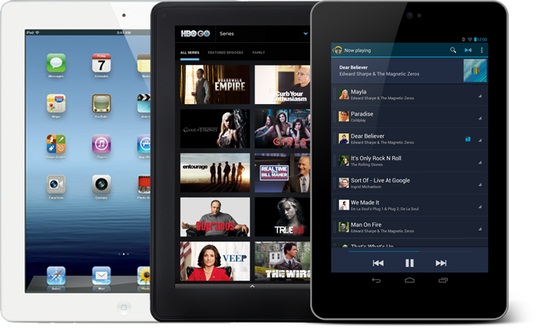Cumulative Android device sales push past iOS for first time

In what can only be described as a turning point for post-PC operating systems, cumulative Android device sales now exceed iOS, and in a shorter time period. Today, during a special media event, Apple reduced the cumulative number of iOS sales to 400 million -- that would be since iPhone's debut in June 2007. But yesterday, Google put Android sales at 500 million, from the G1's launch four years ago this month. The days of iOS' perennial lead are over.
Android has been on the catch-up track for better part of the year. At the end of June cumulative iOS shipments were 410 million, according to Apple. Why CEO Tim Cook put the number at 10 million less today is anyone's guess. Days before the quarter ended, Google put cumulative Android shipments at 400 million. A few months earlier: 365 million and 300 million, respectively. Daily Android activations now total 1.3 million, up from 900,000 in June, according to Google.
At that run rate, Android device sales, based on activations, work out to 117 million every 90 days. By comparison, during calendar second quarter Apple sold just 45 million iOS devices. Those numbers will mean much to developers deciding which platform is priority.
Globally, on handsets, Android sales share was 64.1 percent in second quarter, but only 18.8 percent for iOS, according to Gartner. Where iOS exceeds Android is on tablets, but the numbers are much lower. More than 419 million phones were sold during the quarter, according to Gartner. NPD Display Search forecasts fewer tablet shipments for the year -- 347 million -- than Gartner says were sold in Q2.
In October 2009, I explained why "Apple cannot win the smartphone wars". iPhone is to Android handsets what Macintosh was to the DOS/Windows PC in the 1980s and 1990s. The Mac's rocky start in 1984-85 gave way to great success because of several killer applications, with desktop publishing being among the most important. But by the mid 1990s, Windows PCs pushed down Mac market share. iPhone follows similar path.
But since iPad's huge successful launch two-and-a-half years ago, iOS looked like winner of the larger platform wars. But these new numbers raise doubts.
Typically, successful platforms share six common traits:
- There are good development tools and APIs for easily creating applications
- There is at least one killer application people really want
- There is breadth of useful applications
- Third parties make lots of money
- The platform is broadly available
- There is a robust ecosystem
Platforms succeed for combinations of reasons leading to network effects. But the underlying most important: Third parties make money, lots of it. As Android numbers far exceed iOS, the Mac-Windows comparison looks like the more likely scenario.
Then again, the number of apps available in both stores is already so mindboggling -- 700,000 for iOS, 250,000 of them for iPad. That's the other network effect to consider: Investment. While Android rises above iOS, Apple's platform has huge first-to-market advantage and existing investment from developers and other partners. So Android's rise by no means is a sure winner. But it does represent an important change that shouldn't be overlooked long term.